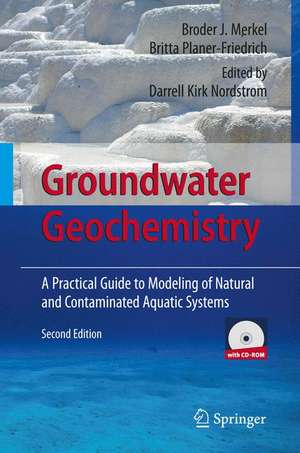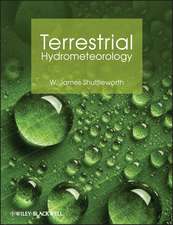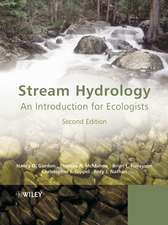Groundwater Geochemistry: A Practical Guide to Modeling of Natural and Contaminated Aquatic Systems
Autor Broder J. Merkel Editat de Darrell K. Nordstrom Autor Britta Planer-Friedrichen Limba Engleză Mixed media product – 13 iun 2008
| Toate formatele și edițiile | Preț | Express |
|---|---|---|
| Paperback (1) | 468.57 lei 6-8 săpt. | |
| Springer Berlin, Heidelberg – 30 apr 2017 | 468.57 lei 6-8 săpt. | |
| Mixed media product (1) | 645.79 lei 6-8 săpt. | |
| Springer Berlin, Heidelberg – 13 iun 2008 | 645.79 lei 6-8 săpt. |
Preț: 645.79 lei
Preț vechi: 759.76 lei
-15% Nou
Puncte Express: 969
Preț estimativ în valută:
123.61€ • 134.31$ • 103.90£
123.61€ • 134.31$ • 103.90£
Carte tipărită la comandă
Livrare economică 21 aprilie-05 mai
Preluare comenzi: 021 569.72.76
Specificații
ISBN-13: 9783540746676
ISBN-10: 3540746676
Pagini: 244
Ilustrații: XI, 230 p. With CD-ROM.
Dimensiuni: 155 x 235 x 19 mm
Greutate: 0.57 kg
Ediția:2nd ed. 2008
Editura: Springer Berlin, Heidelberg
Colecția Springer
Locul publicării:Berlin, Heidelberg, Germany
ISBN-10: 3540746676
Pagini: 244
Ilustrații: XI, 230 p. With CD-ROM.
Dimensiuni: 155 x 235 x 19 mm
Greutate: 0.57 kg
Ediția:2nd ed. 2008
Editura: Springer Berlin, Heidelberg
Colecția Springer
Locul publicării:Berlin, Heidelberg, Germany
Public țintă
Professional/practitionerCuprins
Theoretical Background.- Hydrogeochemical Modeling Programs.- Exercises.- Solutions.
Recenzii
From the reviews:
"Merkel and Planer-Friedrich … provide an excellent introduction to hydrogeochemical modeling for analyzing natural and human impacts on aquatic systems. … it is intended as a practical guide to modeling, but it will make an excellent supplementary resource for the students. Summing Up: Highly recommended. Upper-division undergraduates through professionals." (M. S. Field, CHOICE, November, 2005)
"This book focuses on giving practical support for geochemical modelling … . Is it worthwhile to buy this book … ? Absolutely yes! … Altogether 69 clearly and carefully explained exercises are provided to enhance the knowledge step-by-step. … This book is recommended to all those with some basic hydrogeological or chemical understanding, to graduate students in geosciences, environmental sciences or related studies as well as to representatives of public authorities and enterprises who want to understand the hydrogeochemical interactions better." (Andreas Winkler, Environmental Geology, Vol. 48, 2005)
"Merkel and Planer-Friedrich … provide an excellent introduction to hydrogeochemical modeling for analyzing natural and human impacts on aquatic systems. … it is intended as a practical guide to modeling, but it will make an excellent supplementary resource for the students. Summing Up: Highly recommended. Upper-division undergraduates through professionals." (M. S. Field, CHOICE, November, 2005)
"This book focuses on giving practical support for geochemical modelling … . Is it worthwhile to buy this book … ? Absolutely yes! … Altogether 69 clearly and carefully explained exercises are provided to enhance the knowledge step-by-step. … This book is recommended to all those with some basic hydrogeological or chemical understanding, to graduate students in geosciences, environmental sciences or related studies as well as to representatives of public authorities and enterprises who want to understand the hydrogeochemical interactions better." (Andreas Winkler, Environmental Geology, Vol. 48, 2005)
Caracteristici
Fills a gap in modern text books, focusing on the solution of practical hydrogeochemical questions with the help of Phreeq.





